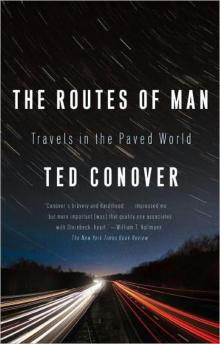Ted Conover 

by The Routes of Man: How Roads Are Changing the World;the Way We Live Today
Genre: Other8
Published: 2010
View: 2636
Read OnlineRead Ted Conover Storyline:
From Publishers Weekly[Signature]Reviewed by Jeb BrugmannIn The Routes of Man, Conover, author of the NBCC award–winning Newjack, reveals globalization's neural system growing along the world's expanding and connecting road systems. Governments and smugglers, armies and insurgents, and the local poor and international NGOs negotiate their ambitions at border crossings, checkpoints, and dives. Tracing the route of rare mahogany from Peru's illegal jungle logging camps to Manhattan's brownstones, he examines how highways connect the fates of forests, untouched tribes, and finicky antique collectors. In the Himalayan frontier of Kashmir, highways are ventures of national territorial control, and in China a growing superhighway system underscores the disparity between the haves and have-nots. Conover's voice is that of a sobered Kerouac, tamed by a bigger conscience, and on an open road increasingly controlled by corporate, government, and military interests. His acclaimed narrative gifts are on full display in a wonderfully evenhanded treatment of the roadway in the Israeli-Palestinian conflict. Highways have been co-opted for Israeli settlements, and Palestinian professors, engineers, and migrant laborers construct ever-shifting back-road routes and taxi-hops to earn their living. With Conover as our guide, we move through Israeli checkpoints in Palestine's West Bank and witness the daily indignities faced by corralled Palestinian commuters and the psychological angst of Israeli soldiers. There is no open road here, just a gritty, fractured infrastructure of hatred that strangles both nations.More subtly, Conover reveals the highway as common social territory, particularly as the meeting place between men and women. His treatment of east African truck drivers—whose travels are suspected to be linked with the global spread of AIDS—avoids stereotype and sensationalism. He is as attentive to and interested by the drudgery of transporting goods as with the truckers' polygamy or encounters with sex workers and police bribery. We meet truck drivers who are true gentlemen and tough, articulate women fully capable of negotiating roadside life. Conover maintains a commitment to accurate portrayal and embraces the whole world, not only its dramatic aspects. The Routes of Man seeks to describe more than to explain this ever-connecting world. It does the former with an agility that leaves the reader anticipating the next adventure. But the narrative fails to build the argument posed in its subtitle: that roads themselves have become a source of change in the world, independent of the nations, armies, and cities that build, control, and fill them with trade and traffic. But this many-textured journey is not to be missed. Conover deftly navigates the romance and harsh reality of a world intent on a real and not just a virtual connectedness.Jeb Brugmann is author of Welcome to the Urban Revolution: How Cities Are Changing the World. Copyright © Reed Business Information, a division of Reed Elsevier Inc. All rights reserved. From Bookmarks MagazineReviewers were generally happy to follow Conover as he brought to life some of the world's most interesting and dangerous routes while managing to steer clear of the thousand "road-as-life" metaphors that could have congested the work. But they tended to criticize him with their own transit analogy: Routes of Man, many wrote, lacks the promised path connecting Conover's adventures perhaps because many of the essays originated as magazine articles in National Geographic, the Atlantic, and other publications. For some critics, this was no issue; the [hardcover's] subtitle, they argued, was clearly an imposition by the marketing department and shouldn't detract from the book. But others wanted more reflection from an author whom they respected for traveling so far and learning so much.Pages of Ted Conover :